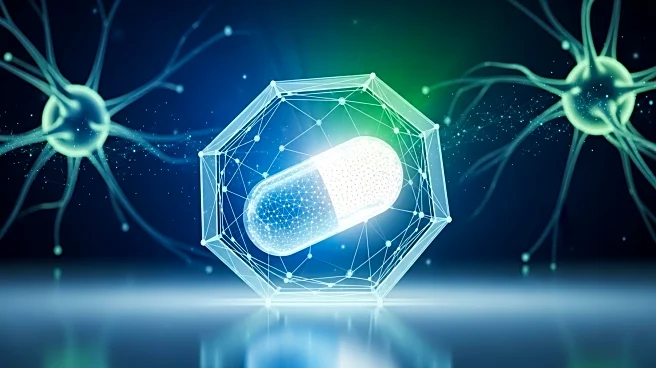What's Happening?
Researchers have developed a novel pill that may enable the brain to self-repair after strokes or traumatic injuries. This breakthrough challenges the traditional belief that adult brains cannot generate new neurons post-injury. The pill works by activating dormant genes that promote neurogenesis, the formation of new brain cells. Early findings suggest that this medication could reduce the need for intensive physical rehabilitation by enhancing the brain's natural recovery processes. The research, which involves repurposing existing medications like Maraviroc, is currently undergoing clinical trials to assess its effectiveness in restoring cognitive and motor functions in stroke patients. The pharmaceutical industry sees this as a promising economic opportunity, with potential applications extending to Alzheimer's disease and other neurodegenerative conditions.
Why It's Important?
This development could significantly impact the treatment of neurological disorders, offering a new approach to recovery that may reduce healthcare costs associated with traditional rehabilitation methods. If successful, the pill could improve outcomes for millions affected by strokes and traumatic brain injuries, providing a more efficient and less resource-intensive recovery process. The research also highlights the potential for pharmacological interventions to supplement or replace existing rehabilitation techniques, which could lead to a paradigm shift in how neurological conditions are treated. The economic implications are substantial, as the pharmaceutical industry could expand into new markets, addressing a broader range of neurological disorders.
What's Next?
The ongoing clinical trials will determine the pill's safety and efficacy, with regulatory bodies like the FDA closely monitoring the developments. If trials are successful, the pill could be integrated into standard treatment protocols, potentially transforming the landscape of neurological care. Collaboration between academic institutions and biotech companies is expected to intensify, with innovations like Stanford's research on blood clot removal devices complementing pill-based approaches. The journey from laboratory to clinical application will require patience, with comprehensive results anticipated in the coming years to fully assess the impact of this groundbreaking approach.
Beyond the Headlines
Ethical considerations are crucial, as the research must balance innovation with safety protocols to avoid unforeseen risks, such as excessive neural stimulation leading to complications like seizures. The study's implications extend beyond individual recovery, potentially influencing international climate policy by linking biomass and natural carbon sinks to climate change mitigation strategies. This holistic approach underscores the need for comprehensive biosphere protection alongside strong climate action.









